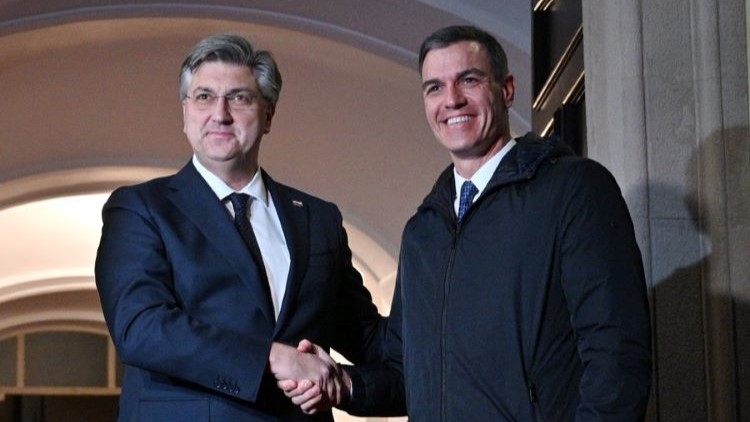Eduardo González
The President of the Government, Pedro Sánchez, began a tour of Austria, Croatia and Slovenia yesterday as part of the round of contacts with the European partners in view of the Spanish Presidency of the Council of the EU and to defend, among other matters, the Spanish proposal for the reform of the energy market, which has been clearly and expressly opposed by Germany and six other Member States of the Union.
The tour began at the Federal Chancellery in Vienna, where Sánchez was received by the Austrian Federal Chancellor, Karl Nehammer, with whom he discussed, among other issues, the need to “advance in the review of the energy market.”
This review, as Sánchez explained during the institutional statement offered to the media at the end of the meeting, must be based on “three major priorities”: achieving “affordable energy prices for homes and companies” in a Europe that “is suffering a rise in prices fundamentally linked to energy prices”, reduce greenhouse gas emissions and “open strategic autonomy, not protectionist, but open”, because “if we have learned anything from this war, from this damn Putin’s war in Ukraine, is precisely the need to increase our strategic autonomy”.
Likewise, Sánchez and Nehammer addressed the need to “comply with the agreed schedule to have a Migration and Asylum Pact before the end of the May 2024 legislature.” Partee, the President of the Government reiterated Spain’s “seamless support” for Ukraine “in defense of territorial integrity and its freedom” and defended the enlargement of the EU “towards countries in the East”, especially “towards the Balkans Westerners”, which “are part of Europe and are essential for the stability of Europe”.
Croatia
After his meeting with Nehammer, Sánchez went to Zagreb, where he was received by the Croatian Prime Minister, Andrej Plenkovic, in the Banski Dvori building, the seat of government. In the institutional statement offered to the media at the end of the meeting, the President of the Government congratulated Croatia for joining the single currency and “the family” of the Schengen area and the Croatian chief executive thanked Spain for the support shown your country to achieve these goals.
Likewise, Sánchez warned of the need to “continue advancing in the reform of the electricity market to protect families, companies and industries in our countries” and to “put all existing European funds” to “protect our economies and help them to modernize and be much more competitive in the double revolution of energy and digital transformation, a double revolution that will make us much more competitive, resilient and autonomous in the face of blackmail that Europe is unfortunately suffering as a result of Putin’s war in Ukraine, in the fundamentally energetic field”.
For this reason, Sánchez reiterated that one of the objectives of the Spanish Presidency will be to “promote the reform of the electricity market, for which Spain has been advocating for many months and even long before the start of the war, and to see how we can reindustrialize Europe with funds and with European responses that strengthen the single European market, which is one of the main achievements of the whole of the EU”.
A group of seven countries led by Germany sent a letter to the European Commission on February 9 in which they demand a limited electricity market reform that maintains the benefits reported by the system in the last decade and that does not compromise climate and energy sources of the EU, an approach contrary to that of countries like Spain. The letter, also signed by Denmark, the Netherlands, Finland, Luxembourg, Latvia and Estonia, highlights the resistance of the electricity market in the face of the crisis derived from Russia’s attack on Ukraine and recalls that its integration has brought “enormous benefits” to the EU, which amount to 34,000 million euros per year in the last decade.
Spain advocates for a structural review that includes the purchase of energy in term to reduce volatility and the price of electricity with the aim of decoupling the cost of renewable energy from gas prices. In addition, Spain, the Government has also asked Brussels for an extension of the Iberian gas cap mechanism in order to continue lowering final consumer prices in the face of the rise in natural gas prices. The European Commission must present a proposal in March to redesign the bloc’s energy market after the Russian invasion of Ukraine has triggered gas prices, a debate to which countries such as Spain or France have made their own contributions and to which now , with this letter, another seven are added.
During his meeting with Plenkovic, Sánchez also addressed the enlargement of the EU towards the Western Balkans and recalled that, in 2020, the Croatian Presidency had already made important progress in relation to Albania and North Macedonia, which culminated in the opening of negotiations on accession last year. Likewise, in terms of migration, both agreed on the need to incorporate a Mediterranean vision into the Migration and Asylum Pact. “The two countries are part of a very important club, MED9,” recalled Sánchez.
Today, Pedro Sánchez will travel to Slovenia, where he will hold a bilateral meeting with the Prime Minister of this country, Robert Golob, at Brdo Castle, in Kranj, 20 kilometers north of the capital, Ljubljana. The day will conclude with an official lunch.







